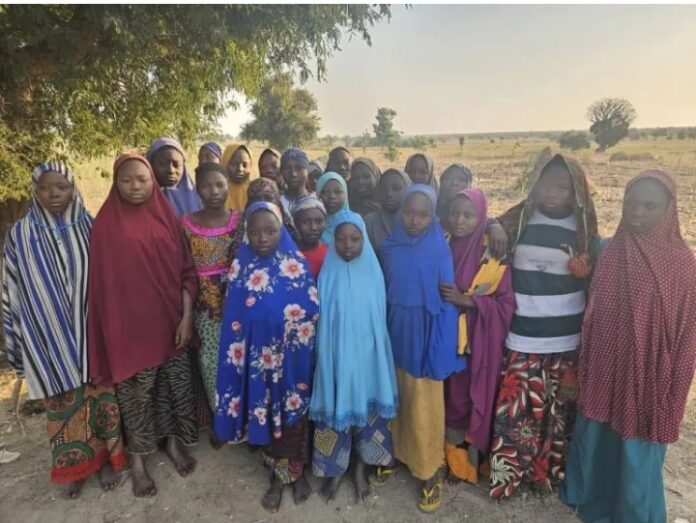Relief returned to Kebbi State on Tuesday as the 24 schoolgirls abducted from Government Girls Secondary School, Maga, in Sakaba Local Government Area, regained their freedom. Their rescue follows coordinated operations by security forces, according to security sources who confirmed the development.
The schoolgirls were taken during a dawn attack last week, an incident that renewed national concern about rising kidnappings across northern Nigeria. The attack happened on November 17, when terrorists stormed the school shortly after a military detachment reportedly left the area. The incident created panic among residents and drew fresh attention to the long-standing problem of school abductions in the country.
Although the rescue has brought joy to families and the community, officials have yet to release details about the condition of the girls or how the rescue operation unfolded. Authorities say more information will be provided as the situation becomes clearer.
The abduction in Maga echoed similar incidents across Nigeria in recent years. Since the 2014 Chibok schoolgirls’ abduction, kidnappers have increasingly targeted schools, especially in rural communities where security presence is limited. Kebbi State itself has experienced several attacks in the past, with bandits operating across remote areas along the borders with Zamfara, Niger, and Sokoto states.
The Maga incident also triggered copycat attacks in other states. In Eruku, Kwara State, terrorists kidnapped 38 people in a separate operation. That group of victims was freed on Sunday, bringing some relief to the community. In Niger State, panic spread after students from a Catholic school went missing. The Christian Association of Nigeria later announced that 50 of the missing students were found safely in their parents’ homes, having fled during the attack.
While confirming the Kebbi rescue, security officials noted that the safe retrieval of the girls resulted from a coordinated effort involving the military, police, local security groups, and intelligence units. Although the specific strategy used remains undisclosed, sources said the operation was carried out carefully to avoid putting the girls at further risk.
Parents and community leaders in Maga expressed deep relief, with many offering prayers of thanksgiving. However, they also repeated calls for the federal and state governments to deploy permanent security personnel to the area. Residents say that without a stable military presence, schools and villages will continue to face danger.
The rescue comes at a time when the federal government has been under pressure to improve national security. President Bola Tinubu, who has frequently spoken about his commitment to ending insecurity, recently urged security agencies to increase their presence in vulnerable communities. He also commended security forces for their ongoing efforts to rescue abducted persons across the country.
Despite government assurances, many Nigerians remain anxious. Over the years, school abductions have forced thousands of students out of classrooms, especially in the northern region. Some states have had to shut down schools in high-risk areas, causing major setbacks to education and deepening the region’s learning crisis.
The Safe Schools Initiative, launched in 2014 after the Chibok abduction, was meant to strengthen school security across the country. However, progress has been slow, and many rural schools still operate without perimeter fencing, surveillance, or sufficient security personnel. Education advocates argue that without sustainable investment in school safety, attacks like the one in Maga may continue.
For now, the safe rescue of the Kebbi schoolgirls has given hope to communities affected by insecurity. But many residents say that hope must be matched with action. They want long-term solutions, including better policing, community-based intelligence gathering, and economic support for young people who may be drawn into criminal activities.

